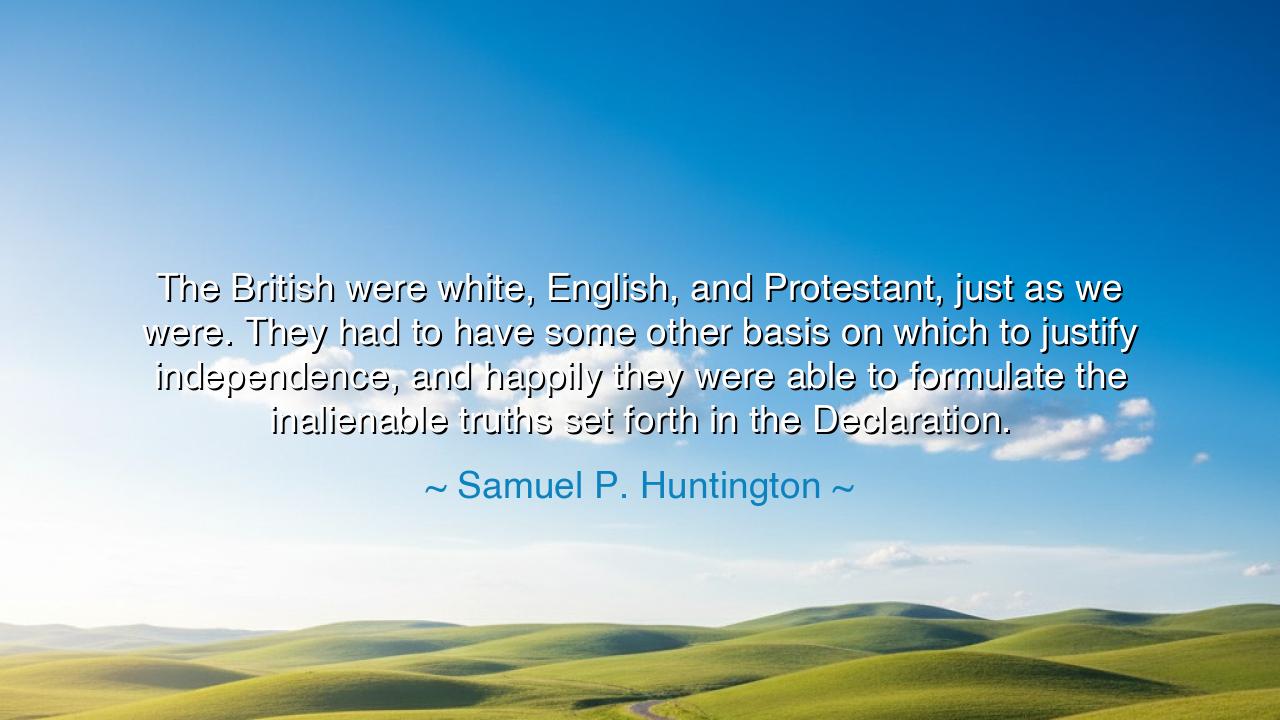
The British were white, English, and Protestant, just as we were.
The British were white, English, and Protestant, just as we were. They had to have some other basis on which to justify independence, and happily they were able to formulate the inalienable truths set forth in the Declaration.






When Samuel P. Huntington wrote, “The British were white, English, and Protestant, just as we were. They had to have some other basis on which to justify independence, and happily they were able to formulate the inalienable truths set forth in the Declaration,” he revealed a truth at once historical and philosophical — that America’s independence was not born from difference of blood or faith, but from difference of ideas. His words strip away the illusions of ethnicity and heritage and point instead to something far deeper: the birth of a nation founded not on who its people were, but on what they believed. In this reflection lies the seed of America’s unique destiny — that it was not created by a clash of tribes, but by a revolution of principles.
The origin of this quote lies in Huntington’s lifelong examination of identity and civilization — of what binds peoples together and what tears them apart. In his studies of political culture and national character, Huntington understood that revolutions often spring from visible divisions: race, language, or creed. Yet in the case of the American Revolution, these could not explain rebellion. The colonists were not an oppressed ethnicity under a foreign empire; they were, as he notes, white, English, and Protestant — kin to their rulers. Thus, the American break from Britain required a justification not of difference in kind, but of difference in principle. The Founders could not simply say, “We are not like you.” They had to say, “We believe in something higher than kings.”
This higher belief found its voice in the Declaration of Independence, that sacred text in which Jefferson, Adams, and Franklin gave words to the soul of a new civilization. They declared that “all men are created equal,” that they possess “unalienable rights” — life, liberty, and the pursuit of happiness — and that governments exist only to secure those rights. These were not ethnic claims or cultural boasts; they were universal truths, moral laws written not by men but by Nature and Nature’s God. Thus, as Huntington observed, it was through philosophy, not heritage, that America justified its birth. The sword won the war, but ideas won independence.
To grasp the depth of Huntington’s insight, one might look to the ancient world. When Socrates stood before the judges of Athens, he too was condemned by men who shared his language and gods — yet his defense rested not on kinship, but on truth. He declared that the law of conscience stands above the decree of rulers. The American Founders were, in spirit, his descendants. They argued not that they were different from the British, but that they were truer to the moral law that the British themselves claimed to honor. This was the paradox: they fought their own brothers in the name of principles both sides professed to believe — liberty, justice, and the rights of man.
The British, for their part, ruled through the authority of tradition — the throne, the crown, the Church. The Americans countered with reason and revelation, asserting that power flows not from the top down but from the people upward. It was a rebellion not of blood, but of political faith. And herein lies the brilliance that Huntington celebrates: that the American nation was built on a creed, not a tribe. The colonists had to invent their own moral justification, and in doing so, they forged an identity unlike any before them — a people defined not by ancestry, but by a covenant of belief.
From this foundation came the greatest experiment in history: a republic grounded in the universality of freedom. Yet Huntington’s observation also carries a warning. A nation born of ideas must be forever vigilant in keeping those ideas alive. Bloodlines can endure through generations, but beliefs must be renewed by conviction. If Americans forget that their unity rests upon shared truths — upon the self-evident rights of every human being — then their independence, once justified by principle, may dissolve into mere identity. The strength of a creed must not give way to the weakness of division.
So, my children of liberty, learn this lesson well: independence is not sustained by skin or speech, but by spirit. The Founders’ victory was not only against Britain, but against the tyranny of apathy and the blindness of custom. Let their example remind you that freedom must always be reasoned, justified, and defended — not because you are different, but because you believe differently. The British and the Americans once shared a flag; what separated them was not color or creed, but courage — the courage to live by the truth that all men are equal in their right to govern themselves. And so, Huntington’s words endure as both tribute and challenge: to remember that the true measure of a nation’s greatness lies not in its might, but in its moral imagination.






AAdministratorAdministrator
Welcome, honored guests. Please leave a comment, we will respond soon